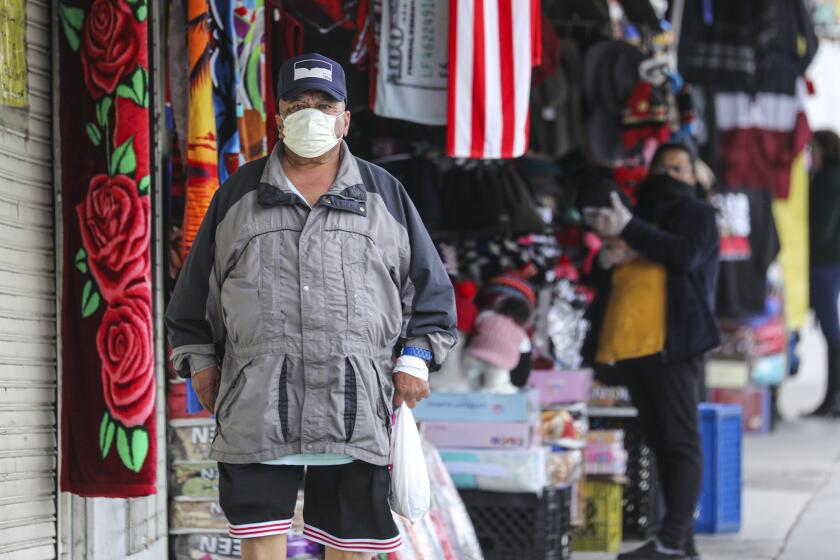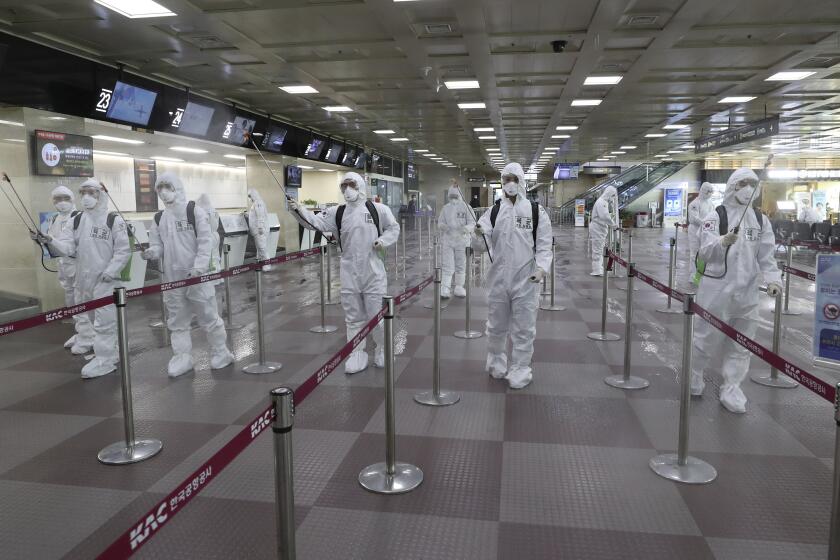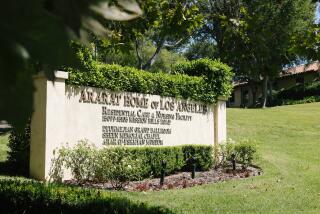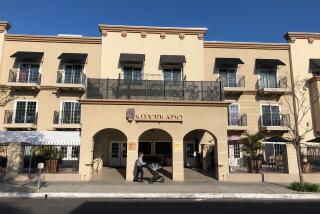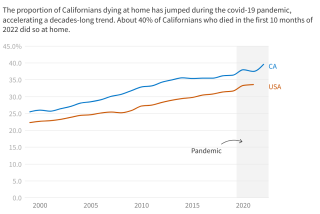Nursing home at center of coronavirus deaths spurs precautions across U.S.
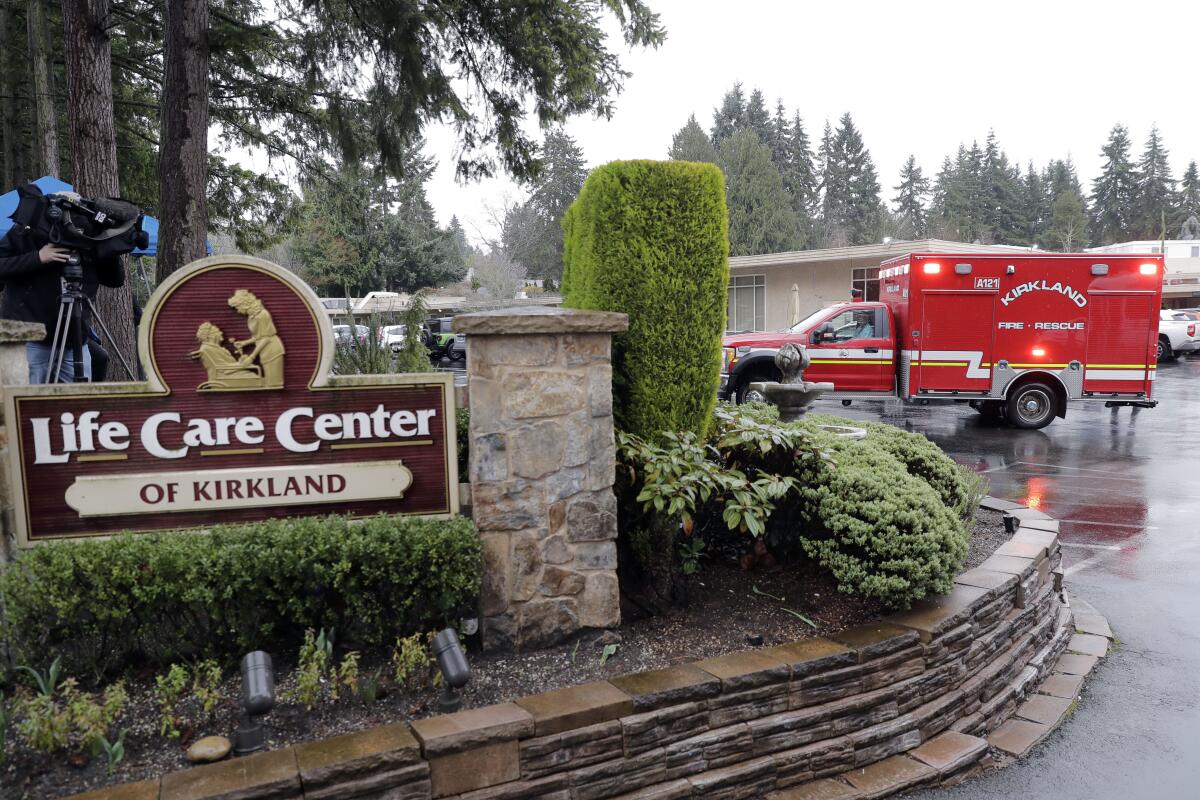
Curtis Luterman moved his mother, Mary, into the Life Care Center of Kirkland, Wash., in June. She is 89 years old. She’d been living on the East Coast, nearly 3,000 miles away. He wanted her to “experience the beautiful Pacific Northwest.” He wanted to change her life for the better.
Instead, she ended up in the nursing home at the terrifying center of the coronavirus outbreak. Thirteen residents of the facility who died amid the epidemic tested positive for COVID-19. Eleven others died in the last 2½ weeks of as-yet-unknown causes.
“I never would have thought that something like this could have happened to her after trying to bring her [here] to improve her life,” Luterman told reporters Thursday during a news conference on the leafy nursing home grounds. “I don’t blame the staff in here for this incident. What I do blame right now is the response from our government officials. ...
“If the CDC’s doing such a bad response on a small little place like this,” he said, “imagine if this was happening in a large nursing home in downtown Los Angeles or in New York City.”
Nursing home operators and government officials have been imagining just that, and such nightmare scenarios have spurred new precautions at facilities across the country. There are cries for widespread testing, fears of protective gear shortages and staffing problems, and confusion about how best to balance the needs of frail elderly residents against the safety of the wider community.
Few places are more fraught with risk than a skilled nursing facility, where sick, elderly and vulnerable people live in close quarters. Since the outbreak at Life Care Center of Kirkland hit the headlines, at least three more Seattle-area nursing homes or senior-living centers have announced possible outbreaks.
Get the latest coronavirus updates from our staff in California and around the world.
Two residents at Issaquah Nursing & Rehabilitation have been hospitalized and “reported to have presumptive positive Covid-19 results,” according to the facility’s website. One resident at Ida Culver House Ravenna has had a similar diagnosis. A staff member at Aegis Living Marymoor in Redmond has been diagnosed with the virus, a company spokeswoman said.
“This is a collision of two vulnerable groups — older people and those in healthcare facilities,” said Michael Dark, staff attorney at California Advocates for Nursing Home Reform. “The concern is people on the outside are bringing in the virus.
“We’re going to be facing a period, maybe months long, where many nursing home staff who are underpaid and overworked may be afraid to go to work,” Dark said. “Staffing levels, which are already low, may get much worse.”
Life Care Center of Kirkland had 180 employees before the outbreak hit. At weekend briefings, company spokesman Timothy Killian said that 70 employees have been quarantined in their homes because they have exhibited symptoms consistent with COVID-19. Three employees have been hospitalized, he said, and one has tested positive for the virus.
Killian said Sunday that Life Care would like to test all of its employees for the virus and has asked for the necessary test kits. “We don’t have test kits to do that,” he said. “It’s concerning to us.”
The World Health Organization has so far resisted describing the coronavirus outbreak as a pandemic, but many experts agree it’s the most accurate word.
“Various government agencies” have helped Life Care Center beef up its depleted staff, the company said in a fact sheet, sending several nurses, two nurse practitioners and a doctor. That help, however, did not arrive until Saturday.
Staffing problems have bubbled up in sometimes dramatic fashion at the Kirkland nursing home since the outbreak began. Residents’ family members called the Thursday news conference to raise the alarm about conditions and take government officials to task for not stepping in sooner.
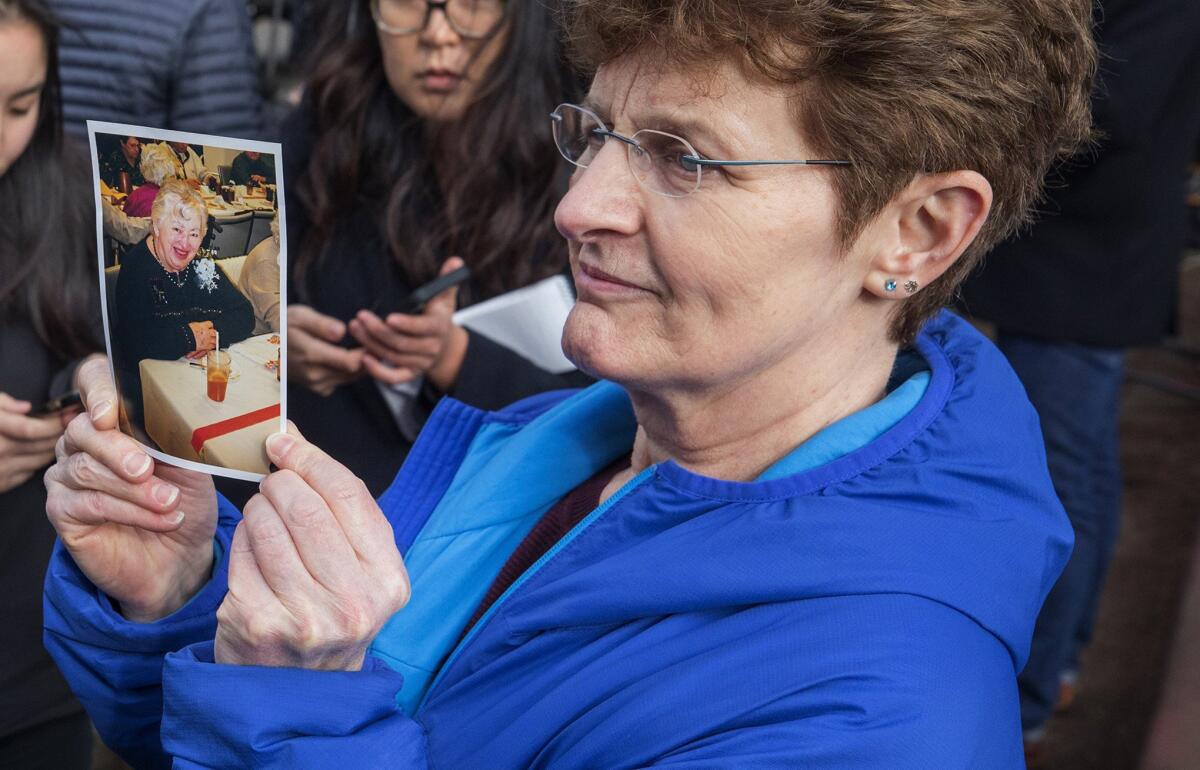
When Pat Herrick faced reporters, she talked about how much her mother loved Life Care Center, the elderly woman’s home for the last seven years, about how Elaine Herrick would hand out roses on Mother’s Day to residents and staff alike and how she would make sure the workers got Christmas gifts, too.
Then, Herrick broke down in tears.
“I got a phone call this morning that she passed, at 3:30 in the morning,” Herrick said Thursday. “She’d been really well. As far as we knew, she wasn’t sick.”
But then the phone rang again, Herrick said, about seven hours later. Another Life Care employee was on the line. This one told Herrick that her mother was just fine, no fever, no symptoms.
This one was wrong.
The state’s second death linked to COVID-19 was confirmed in Santa Clara County. And L.A. County announced two new cases.
The nurse who had called to report the elderly woman’s death was so swamped, Herrick said, that she hadn’t updated the dead woman’s chart.
Herrick said she has compassion for employees of the afflicted nursing home. Her good thoughts, however, did not extend to the federal Centers for Disease Control and Prevention and Vice President Mike Pence, who has been put in charge of the coronavirus response.
“I think it’s tragic that they didn’t have the support here to do the work that needed to be done in a good way,” Herrick said. “How do we contain this? How do we deal with people that are ill? How do we protect ourselves?”
Those questions loom large in a country whose fastest-growing age group is people 85 and older. According to the National Center for Health Statistics, there were 15,600 long-term care facilities in the U.S. in 2016, and nursing homes had 1.3 million residents in 2015. Those are the agency’s most up-to-date numbers.
On Wednesday, the Centers for Medicare & Medicaid Services said nursing homes should screen visitors and staff for symptoms of respiratory infection, for international travel to restricted countries and for contact with anyone who has or is suspected to have COVID-19.
If a visitor fails the screening, the agency’s guidance said, “facilities may restrict their entry.” Workers with symptoms of a respiratory infection “should not report to work.”
As the U.S. shifts from “containment” to “mitigation,” officials warn of “two months ... of difficulty.” Grand Princess cruise ship is set to dock Monday at the Port of Oakland.
In a conference call with reporters, industry representatives said the federal guidelines allowing them to limit visitors are much needed.
“We have implemented a travel screen and a respiratory signs and symptoms screen that visitors fill out,” said Janet Snipes, executive director of Holly Heights Nursing Center in Denver. “Some of them have been quite reluctant to comply.”
Life Care Center of Kirkland has prohibited all visitors. Family members have resorted to knocking on windows and holding up messages for their loved ones inside. Those who can, call regularly. But people like Annissa Walsh are out of luck. Her mother-in-law has severe dementia, Walsh said Thursday, “so we don’t know how she is. We can’t talk to her on the phone. We can’t get her to tell us how she’s doing.”
Aegis Living Marymoor has instituted “community-wide isolation,” barring visitors, closing dining rooms and canceling group activities. Issaquah Nursing also has barred all visitors, while Ida Culver House is “restricting all nonessential visitors” and delivering meals to residents’ apartments.
Dr. Noah Marco, chief medical officer of the Los Angeles Jewish Home, was in a meeting with facility leadership on Wednesday when the federal guidance landed in his email. “And I said, ‘Hey, guess what I just got.’ And we immediately started our planning process.”
The Jewish Home’s main campus is in Reseda. It cares for more than 1,000 residents in a variety of settings, including a skilled nursing facility for 550, a 10-bed geriatric psych ward, assisted living, independent living, memory care and short-term rehabilitation.
On Thursday, Marco emailed residents and family members laying out the Jewish Home’s plans to protect the most vulnerable members of its community.
On Friday, a tent went up in the courtyard with a sign that read, “Mandatory Screening.” All visitors have their temperature taken on arrival. They must fill out a questionnaire that asks about recent international travel, symptoms of respiratory illness and contact with someone infected with COVID-19. Anyone who fails the screening will be turned away.
Visiting hours — normally 24/7 — are now limited to an eight-hour stretch from 11 a.m. to 7 p.m. Friends and family members have been asked to minimize visits. The home is still admitting new patients, but they must be screened, too.
There are hand-cleansing stations throughout the facility, stocked with masks and sanitizer. Off-campus activities such as concerts and movies are out, and so are trips to what Marco described as residents’ two favorite destinations: the 99 Cents Only Stores and a local Chinese restaurant. Community groups that normally would visit with or entertain residents are barred for the foreseeable future.
Marco said he worried that the federal guidelines were vague about what it meant to screen visitors. And he feared that family members and friends would panic when they got his email describing the new world of COVID-19 prevention.
“People might have falsely assumed,” he said, “‘I’m going to be coming to this facility, and they’re going to take my blood, they’re going to do something invasive, they’re going to test me for COVID, and, oh, my God, am I going to have to be at home for two weeks?’
“No,” he said, “we’re just going to ask you, ‘Are you a high-risk person?’ ... If you’re high risk, go away. If you’re low risk, come on in.”
La Ganga reported from Los Angeles, Read reported from Kirkland.
More to Read
Sign up for Essential California
The most important California stories and recommendations in your inbox every morning.
You may occasionally receive promotional content from the Los Angeles Times.
